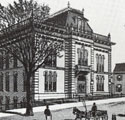
The Library
 In October of 1875 James H. Carleton asked Whittier to write an occasional verse for the dedication of the Haverhill Public Library. In spite of having less than a month to write the poem for the November dedication, Whittier managed to write an appropriate piece which was set to music and sung.
In October of 1875 James H. Carleton asked Whittier to write an occasional verse for the dedication of the Haverhill Public Library. In spite of having less than a month to write the poem for the November dedication, Whittier managed to write an appropriate piece which was set to music and sung.
The Library
Sung at the opening of the Haverhill Library, November 11, 1875.
“Let there be light!” God spake of old,
And over chaos dark and cold,
And through the dead and formless frame
Of nature, life and order came.
But Whittier makes it clear in the second stanza that he’s not one of those who insists on a literal reading of Genesis.
Faint was the light at first that shone
On giant fern and mastodon,
On half-formed plant and beast of prey,
And man as rude and wild as they.
Whittier traces the evolution of writing in the next two stanzas.
Age after age, like waves, o’erran
The earth, uplifting brute and man;
And mind, at length, in symbols dark
Its meaning traced on stone and bark.On leaf of palm, on sedge-wrought roll;
On plastic clay and leathern scroll,
Man wrote his thoughts; the ages passed,
And lo! The Press was found at last!
Whittier concludes the evolution, from God’s “Let there be light” to the “thrill” in the “lords of thought” awaiting the reader in the alcoves of the library.
And here, to-day, the dead look down,
The kings of mind again we crown;
We hear the voices lost so long,
The sage’s word, the sibyl’s song.Her Greek and roman find themselves
Alive along these crowded shelves;
And Shakespeare treads again his stage,
And Chaucer paints anew his age.And if some Pantheon’s marbles broke
Their stony trance, and lived and spoke,
Life thrills along the alcoved hall,
The lords of thought await our call!
Full text of "The Library"
